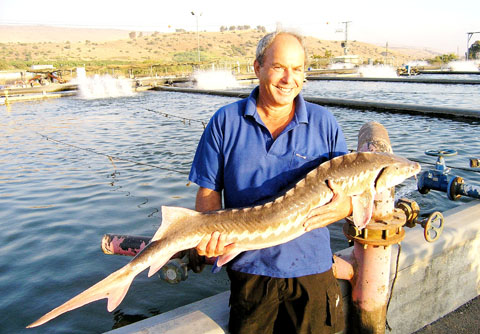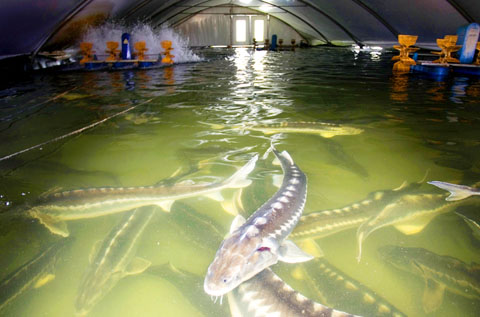Thousands of kilometers from the Caspian Sea, Israel is cashing in on a global caviar crisis, gearing up to export tonnes of the delicate and costly roe from farm-raised sturgeon.
It may not be quite kosher — depending on who you ask — but there is definitely a huge international demand for the gourmet treat.
“This is top quality,” said Yigal Ben Tzvi, managing director of Caviar Galilee, holding up a blue tin of “Made in Israel” sturgeon eggs, which he says caviar giant Petrossian buys wholesale at US$2,800 a kilo.

PHOTO: AFP
In the past, the Caspian Sea was the world’s main source of the coveted delicacy, but overfishing and pollution have led to dwindling yields in the region, triggering a grave caviar shortage.
REPUTATION
Israel is getting a name for itself on the lucrative market by farming Osetra sturgeon at Kibbutz Dan in the north of the country, just a stone’s throw from positions of the Hezbollah Shiite militia in southern Lebanon.

PHOTO: AFP
To date, Caviar Galilee’s limited production has earned praise from some distinguished connoisseurs and orders from top retailers.
And, said Ben Tzvi as he admired his fish splashing in the farm ponds, payoff time is just weeks away when he expects to harvest 3 tonnes of high quality caviar from among the 7,000 females born in Israel of eggs imported from the Caspian Sea.
Staff at Kibbutz Dan are already checking on the money-makers, inserting a special instrument to extract a few eggs from the fish in order to determine their size and quality.
Each of the females carries an average of 2kg of the precious pearls, which could bring in as much as US$7.7 million.
BEGINNINGS
What could one day become a cash-churning business began with a simple idea: Raising a fish destined specifically for the sizeable Russian-Israeli population.
“Then in 2003, caviar prices skyrocketed so we decided to get into this business,” Ben Tzvi said.
The first step was to bring in fertilized sturgeon eggs from the Caspian Sea. Once the gender of the fish is determined — this usually takes four years — they are placed in sex-segregated tanks.
Males are destined for the fish market and what Ben Tzvi describes as “the most beautiful females” are artificially inseminated and kept as caviar producers.
Normally, a female Osetra takes about 15 years to reach egg-bearing maturity, but Israeli biologist Avshalom Hurvitz has managed to cut the period to eight or nine years.
The fish are pampered with a special diet specially prepared at a nearby factory and swim in water drawn from the snow-fed Dan river, kept at a constant temperature and regularly oxygenated.
KOSHER?
Sturgeon is one of the world’s oldest fish and has been around since the days of the dinosaurs.
But is it kosher?
Most rabbis say sturgeon — and by extension caviar — are not because the fish apparently has no scales, which makes it a forbidden food under Jewish dietary laws.
But Hebrew University scientist Berta Levavi-Sivan, who has participated in the sturgeon-rearing project, begs to differ, insisting that magnification will reveal that the fish do indeed have tiny scales.
“If you ask me, it’s kosher,” Levavi-Sivan said.

WAITING GAME: The US has so far only offered a ‘best rate tariff,’ which officials assume is about 15 percent, the same as Japan, a person familiar with the matter said Taiwan and the US have completed “technical consultations” regarding tariffs and a finalized rate is expected to be released soon, Executive Yuan spokeswoman Michelle Lee (李慧芝) told a news conference yesterday, as a 90-day pause on US President Donald Trump’s “reciprocal” tariffs is set to expire today. The two countries have reached a “certain degree of consensus” on issues such as tariffs, nontariff trade barriers, trade facilitation, supply chain resilience and economic security, Lee said. They also discussed opportunities for cooperation, investment and procurement, she said. A joint statement is still being negotiated and would be released once the US government has made

NEW GEAR: On top of the new Tien Kung IV air defense missiles, the military is expected to place orders for a new combat vehicle next year for delivery in 2028 Mass production of Tien Kung IV (Sky Bow IV) missiles is expected to start next year, with plans to order 122 pods, the Ministry of National Defense’s (MND) latest list of regulated military material showed. The document said that the armed forces would obtain 46 pods of the air defense missiles next year and 76 pods the year after that. The Tien Kung IV is designed to intercept cruise missiles and ballistic missiles to an altitude of 70km, compared with the 60km maximum altitude achieved by the Missile Segment Enhancement variant of PAC-3 systems. A defense source said yesterday that the number of

Taiwanese exports to the US are to be subject to a 20 percent tariff starting on Thursday next week, according to an executive order signed by US President Donald Trump yesterday. The 20 percent levy was the same as the tariffs imposed on Vietnam, Sri Lanka and Bangladesh by Trump. It was higher than the tariffs imposed on Japan, South Korea and the EU (15 percent), as well as those on the Philippines (19 percent). A Taiwan official with knowledge of the matter said it is a "phased" tariff rate, and negotiations would continue. "Once negotiations conclude, Taiwan will obtain a better

FLOOD RECOVERY: “Post-Typhoon Danas reconstruction special act” is expected to be approved on Thursday, the premier said, adding the flood control in affected areas would be prioritized About 200cm of rainfall fell in parts of southern Taiwan from Monday last week to 9am yesterday, the Central Weather Administration (CWA) said. Kaohsiung’s Taoyuan District (桃源) saw total rainfall of 2,205mm, while Pingtung County’s Sandimen Township (三地門) had 2,060.5mm and Tainan’s Nanhua District (南化) 1,833mm, according to CWA data. Meanwhile, Alishan (阿里山) in Chiayi County saw 1,688mm of accumulated rain and Yunlin County’s Caoling (草嶺) had 1,025mm. The Pingtung County Government said that 831 local residents have been pre-emptively evacuated from mountainous areas. A total of 576 are staying with relatives in low-lying areas, while the other 255 are in shelters. CWA forecaster